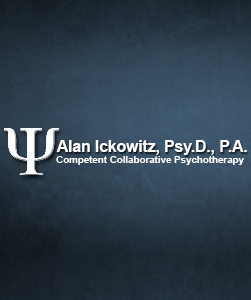Dunedin Psychotherapy
HOW DO I KNOW WHEN I NEED TO TALK TO A PROFESSIONAL AND WHAT DOES PSYCHOTHERAPY HAVE TO OFFER ME?
By Alan Ickowitz, Psy.D.
Many people who seek the services of a licensed psychologist do so because of an existing mental health or substance abuse disorder. People suffering from depressive disorders, anxiety disorders, alcohol and/or drug addictions, and dual diagnoses often experience symptom relief and improved functioning with the help psychotherapy can provide. The American Psychological Association reports that 50% of patients noticeably improve after only 8 therapy sessions and 75% improve at the end of 6 months of psychotherapy for a variety of problems. Medications are also used to help many who suffer from these conditions and a person may be in therapy and be taking medications at the same time. For some problems like depression, there is evidence to suggest that psychotherapy and medication are equally effective. In addition, Psychotherapy is often the preferred treatment approach for problems of stress and anxiety although medications can be used effectively in some of these cases as well.
There are other situations, however, when a person may feel that he or she is having an emotional or psychological problem but may not be sure if they require professional help. This question may arise when one is finding it difficult to function at his or her best or when feeling overwhelmed by stress, worries, fears, or by the tension of inner conflicts and/or conflicts with others. Some indicators that suggest it would be helpful to seek therapy would be if these conflicts or stressors begin to interfere with one’s ability to concentrate effectively, when eating or sleeping habits are disrupted, or when finding enjoyment in one’s life becomes difficult or impossible. In still other situations, the question of whether or not to talk to a psychologist can be prompted by the recognition that patterns of thinking, feeling, and behaving may be interfering with one’s ability to obtain desired goals or to be fulfilled in personal and/or familial relationships. In these situations, beginning a course of therapy may be appropriate to help a person determine how these patterns originated and how they may be altered.
If a decision is made to talk to a mental health professional, a person can expect to be involved in a very unique and personal relationship. For most people, it will be the only time in their lives when they will be in a relationship where they can focus exclusively on their own emotional needs without being concerned about meeting the needs of the other person. It is a situation where one can have the undivided attention of a trained professional whose role is to assist them in developing a greater understanding and respect for their thoughts and feelings, and to help them find ways to achieve emotional growth and well being.
Sometimes concerns regarding time, energy, and cost may prevent a person from seeking the help they desire. While these are not trivial concerns by any means, therapy is similar to many other important and worthwhile endeavors: you often get out of it what you are willing to put into it. In my clinical practice, I attempt to help my clients get as much as they can out of their therapy experience given their particular goals and their willingness to work together with me to achieve them.

